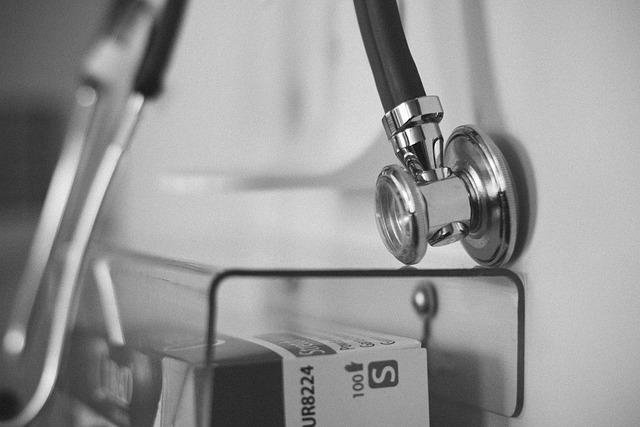In the fast-paced rhythm of daily life, it’s easy to overlook the quiet moments that keep us well—those regular checkups that often slip down our list of priorities. Yet, beneath the routine nature of these visits lies a powerful tool for safeguarding our health, catching hidden concerns, and paving the way for a longer, more vibrant life. This article delves into why regular medical checkups matter, illuminating how these seemingly simple appointments serve as a cornerstone of proactive health care in an ever-changing world.
Table of Contents
- The Preventive Power of Early Detection
- Building a Comprehensive Health Baseline
- How Checkups Foster Patient-Doctor Partnerships
- Tailoring Wellness Plans Through Consistent Monitoring
- Mental Health Screening as a Vital Component
- Maximizing the Benefits of Routine Health Assessments
- Q&A
- The Conclusion

The Preventive Power of Early Detection
Early detection acts like a health compass, guiding us away from potential crises before they arise. By identifying subtle changes or warning signs, regular checkups empower you to address health issues when they are most manageable. This proactive approach can significantly reduce the severity of illnesses and even prevent them from worsening. It’s a chance to rewrite the story of your health, often turning what could have been a major emergency into a simple, treatable condition.
Screenings and routine tests provide a snapshot of your current well-being and unveil hidden risks. Simple assessments like blood pressure checks, cholesterol levels, and cancer screenings create a foundational knowledge base. Consider how early intervention affects outcomes:
- Lower treatment complexity – conditions caught early often require less invasive options.
- Cost-effective care – early management is typically less expensive than treating advanced diseases.
- Peace of mind – maintaining control over your health reduces anxiety about unknown threats.
| Condition | Benefit of Early Detection | Common Early Test |
|---|---|---|
| Hypertension | Prevents heart and kidney damage | Blood Pressure Screening |
| Diabetes | Avoids complications like neuropathy | Blood Glucose Test |
| Breast Cancer | Improves survival rates | Mammography |
| Colon Cancer | Early removal of polyps | Colonoscopy |
Building a Comprehensive Health Baseline
Establishing a clear understanding of your current health status is essential for making informed lifestyle choices and identifying potential issues early. Through regular evaluations, healthcare professionals gather vital data — including blood pressure, cholesterol levels, and body mass index — to construct a detailed profile of your well-being. This baseline acts like a personalized health map, guiding proactive measures and helping avoid surprises down the road.
The process isn’t just about numbers; it’s about capturing a holistic view of your physical and mental health. Think of it as assembling pieces of a puzzle, such as:
- Medical history and lifestyle habits
- Family health patterns that could affect you
- Current symptom checks and risk assessments
By consistently monitoring these elements, you empower yourself to detect subtle changes early and collaborate with your doctor to tailor prevention strategies that fit YOU.
| Health Metric | Normal Range | Importance |
|---|---|---|
| Blood Pressure | 90/60 – 120/80 mmHg | Indicator of cardiovascular health |
| Cholesterol | < 200 mg/dL | Assesses risk of artery disease |
| Blood Sugar | 70 – 99 mg/dL (fasting) | Detects early signs of diabetes |
How Checkups Foster Patient-Doctor Partnerships
Regular interactions during health checkups transform the traditional patient-doctor dynamic into a true collaboration. These appointments provide a dedicated space to discuss concerns openly, ask questions, and receive personalized advice. Over time, this ongoing dialogue builds trust and understanding, turning medical visits from routine obligations into meaningful conversations centered on well-being.
Checkups also help doctors tailor care to the evolving needs of their patients. By monitoring health trends, lifestyle habits, and treatment responses, physicians can fine-tune recommendations and interventions. This partnership approach nurtures a proactive attitude toward health, encouraging patients to take ownership of their journey with the assurance that expert support is always within reach.
- Consistent communication strengthens trust and transparency.
- Shared decision-making empowers patients to contribute to their care plans.
- Early detection benefits from ongoing monitoring and updates.
| Checkup Benefit | Impact on Partnership |
|---|---|
| Personalized advice | Enhances treatment relevance |
| Health trend monitoring | Informs preventive strategies |
| Symptom discussion | Promotes early intervention |
Tailoring Wellness Plans Through Consistent Monitoring
Consistent health monitoring serves as the foundation for creating personalized wellness plans that evolve with your body’s unique needs. By tracking vital signs, lifestyle changes, and emerging symptoms over time, healthcare professionals can gain a dynamic insight into your health journey. This ongoing assessment allows for proactive adjustments, whether it’s fine-tuning nutrition, exercise routines, or medication dosages, ensuring each plan remains effective and aligned with your goals.
Consider the following benefits of tailored wellness plans powered by regular monitoring:
- Early problem detection: Spotting subtle shifts before they become critical.
- Optimized resource allocation: Focusing efforts where they are most needed.
- Enhanced motivation: Personalized feedback encourages sustained commitment.
| Monitoring Factor | Adjustment Example | Impact |
|---|---|---|
| Blood Pressure | Modify sodium intake | Reduces hypertension risk |
| Physical Activity | Increase cardio sessions | Improves cardiovascular health |
| Sleep Patterns | Introduce relaxation techniques | Enhances restorative rest |
Mental Health Screening as a Vital Component
Mental well-being is often overlooked in routine health evaluations, yet it plays a crucial role in overall wellness. Early identification through screening can detect subtle changes in mood, anxiety, or cognitive functions before they escalate into more serious conditions. Incorporating mental health assessments into regular checkups allows healthcare providers to offer timely support, tailor treatments, and connect patients with essential resources. This proactive approach not only promotes recovery but also reduces the stigma surrounding mental health challenges by normalizing the conversation.
Routine mental health screenings benefit individuals by:
- Uncovering hidden symptoms that might not be obvious during casual conversations.
- Guiding personalized care plans based on comprehensive evaluations.
- Enhancing overall quality of life through early intervention and support.
- Reducing long-term healthcare costs by preventing severe complications.
| Screening Tool | Purpose | Frequency Recommended |
|---|---|---|
| PHQ-9 | Depression assessment | Annually or as needed |
| GAD-7 | Anxiety evaluation | Annually or when symptoms arise |
| MMSE | Cognitive function check | Every 2 years for adults over 60 |
Maximizing the Benefits of Routine Health Assessments
Routine health assessments serve as a critical checkpoint on your wellness journey, offering a window into your body’s current state and potential future risks. Regular evaluations enable early detection of conditions such as high blood pressure, diabetes, and cholesterol imbalances, which often develop silently over time. By staying ahead of these issues, you empower yourself to take preventive action through lifestyle adjustments or timely medical intervention. This proactive approach not only safeguards your health but also enhances your quality of life, allowing you to maintain vitality and avoid the heavy toll of advanced diseases.
Incorporating regular checkups into your schedule can also build a strong partnership with healthcare providers, fostering personalized care tailored to your unique needs. Here are some key benefits to keep in mind:
- Customized Health Plans: Develop strategies that fit your lifestyle and goals.
- Trend Monitoring: Track changes over time to fine-tune treatments.
- Peace of Mind: Reduce anxiety by confirming your health status regularly.
- Cost Savings: Address issues early before they escalate into expensive treatments.
| Checkup Element | Frequency | Main Benefit |
|---|---|---|
| Blood Pressure Screening | Annually | Prevents heart disease |
| Cholesterol Test | Every 4-6 years | Detects risk for stroke |
| Blood Glucose Check | Every 3 years | Monitors diabetes risk |
Q&A
Q&A: Why Regular Checkups Matter
Q1: What exactly is a regular checkup?
A regular checkup is like a seasonal tune-up for your body—a routine visit to your healthcare provider to assess your overall health, screen for potential issues, and update any necessary vaccinations or tests. It’s proactive care that helps catch problems before they snowball.
Q2: Why should I bother scheduling checkups if I feel perfectly healthy?
Feeling fine is great, but many health conditions sneak in silently before showing symptoms. Regular checkups act as an early warning system, detecting hidden issues like high blood pressure or early-stage diabetes before they cause serious harm.
Q3: How often should I get a checkup?
Frequency depends on your age, health history, and risk factors, but typically, adults should aim for a yearly or biennial visit. Your healthcare provider can tailor the schedule based on your unique needs.
Q4: What kind of tests might I expect at a checkup?
Expect a mix of physical exams and screenings—blood pressure measurement, blood tests for cholesterol and glucose, BMI checks, and sometimes vision or hearing tests. Your doctor may also discuss lifestyle habits to offer personalized advice.
Q5: Can regular checkups actually save me money?
Absolutely. Detecting and managing health conditions early often means less costly treatments down the road. Preventive care can keep small health hiccups from turning into expensive hospital stays.
Q6: What if I don’t like doctors or feel anxious about appointments?
This is common! Try to view checkups as empowering rather than intimidating—a chance to take control of your health. Bringing a friend or jotting down questions beforehand can make visits less daunting.
Q7: Is it true that checkups improve my lifespan?
While no visit is a magic bullet, regular checkups contribute to longer, healthier lives by keeping you informed and on track with preventive measures. Knowledge truly is power when it comes to health.
Q8: How do I prepare for a checkup?
Bring a list of current medications, any symptoms or concerns you have, and your medical history. Wearing comfortable clothes and arriving a bit early can help make the visit smoother.
Q9: What if my checkup reveals something concerning?
It’s normal to feel uneasy, but remember, early detection improves outcomes. Your healthcare provider will guide you through next steps, whether that’s lifestyle changes, further testing, or specialist referrals.
Q10: Can technology replace regular checkups?
While fitness trackers and telehealth offer valuable tools, they can’t fully substitute the comprehensive assessment a physical checkup provides. In-person visits remain crucial for a holistic health picture.
Regular checkups are the unsung heroes of personal wellness—a simple habit with outsized benefits. Embrace them as a vital part of your health journey!
The Conclusion
In the intricate tapestry of health, regular checkups weave patterns of prevention, awareness, and peace of mind. They are more than routine appointments—they are vital moments to pause, reflect, and act before small concerns grow into silent threats. Embracing these checkups is embracing a proactive partnership with your well-being, ensuring that the story of your health continues with clarity and confidence. After all, in the journey of life, staying one step ahead often begins with a simple visit to the doctor.

